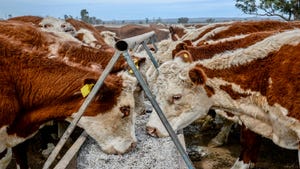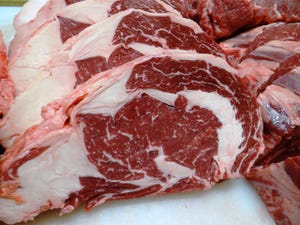Speaker Snippets From The Fort Collins Rallies
The two competing sides in the debate over the proposed GIPSA rules held rallies in Fort Collins on Thursday night, the eve of the USDA/Department of Justice workshop on livestock competition set for the Colorado State University campus on Friday.
August 27, 2010

The two competing sides in the debate over the proposed GIPSA rules held rallies in Fort Collins on Thursday night, the eve of the USDA/Department of Justice workshop on livestock competition set for the Colorado State University campus on Friday.
At the Hilton, a few hundred opponents of the GIPSA rule politely listened to a panel discussion and press conference hosted by the National Cattlemen’s Beef Association (NCBA) and the National Pork Producers Council (NPPC). Across town at the Marriott, a rowdier pro-GIPSA crowd of about 600 or so cheered the strongly populist message in a program billed as a “Public Forum To Save Rural America and Family Ranching.”
The level of emotion was obvious between the two gatherings. The NCBA/NPPC function was more scholarly, as a panel of hog and cattle producers, lawyers, academics and economists discussed the potential effects of the GIPSA rule on market freedom, industry structure, consumer demand and industry competitiveness. Meanwhile, the pro-GIPSA crowd heard from “independent ranchers and farmers, meatpacking workers, consumers, urban farmers and food-justice activists,” representatives of such diverse groups as R-CALF, Rocky Mountain Farmers Union, Missouri Rural Crisis Center, United Food and Commercial Workers, and Food & Water Watch.
At the NCBA/NPPC event, Sam Carney, NPPC president and a hog and cattle producer who also raises corn, soybeans and hay, lamented the GIPSA rule as “too vague.”
He asked: “What does this rule mean to my operation; I’m extremely scared.” He said risk management is extremely important in today’s livestock climate. “If anything, we need more options for marketing in this business, not fewer.”
Mark Legan, a first-generation farmer who operates a family-owned farm near Coatesville, IN, says risk management is the big issue. “I want to manage my risk and marketing contracts allow me to do that.”
He added that “we’re in a global marketplace; we’re competing with nations across the world. Everything we do to add costs to U.S. production is detrimental.”
Brent Sandidge is manager for Ham Hill Farms in Marshall, MO, a family corporation with hogs and crops. He says his home state witnessed the effects of a GIPSA-style law when it passed a price discrimination law a few years back. “It was only in effect for four months,” but says a University of Missouri study determined that state producers lost almost $20 million as a result of the experiment.
Steve Meyer, founder and president of Paragon Economics, an economic consulting firm working primarily in livestock and meat marketing, says risk and uncertainty always mean extra costs, costs that are invariably passed on to consumers. The GIPSA rule, he says, will result in higher prices for consumers and lower prices for producers.
“In my 20 years in the pork industry, I know of no marketing arrangement that was coerced. Now, some of those arrangements might not have worked out as well as the willing parties had hoped, but I don’t think federal law is needed to resolve those issues.” He added that, purely as a citizen, he dislikes the notion of government bureaucrats writing laws that clearly countermand what the courts and Congress have stipulated.
Stephen Koontz, a Colorado State University economist, says that if producers perform the tasks to improve their production, they should have the opportunity to be paid for it. “Packers will figure out how to live with the new policy; they may change how they do business, but not whether they are in business.”
He says a 2003 study that looked at the impacts of eliminating alternative marketing agreements found that, in 2003 dollars, the effect would be $9.5 billion in losses for producers in the short term, and $49.5 billion in the long term, with cow-calf producers being the hardest hit.
Robbie Baird LeValley is a cow-calf producer from Hotchkiss, CO, and president of the Colorado Cattlemen’s Association. She and her family are also co-owners of Homestead Meats, a direct-beef marketing business in operation since 1995. A total of six families co-own the business with each marketing one third of their fat cattle through the business with the remaining two thirds being marketed directly to feedlots. Homestead Meats also owns its own USDA-inspected packing plant.
“For years, SDA has advocated exactly what we are doing – going direct to the consumer. The GIPSA rule would hurt us by removing our options,” she says. She called for a cost-benefit analysis of the proposed GIPSA rule.
Jerry Bohn serves as general manager and is part owner of Pratt Feeders in Pratt, KS, a 115,000-head feeding operation. He’s a current board member of U.S Premium Beef.
He says there’s as much as a $400 difference in the value of steers in a single feedlot pen, “but this new GIPSA rule says they are all equal. Beef producers will get hurt, not the packers. We (Pratt Feeders) still sell 60% of our cattle on the cash market. If I lose those premiums, I’ll pay less for cattle.”
James Herring is president and CEO of Friona Industries, LP in Amarillo, TX, the fourth-largest cattle-feeding operation in the U.S. He says he’s bought more than 10 million head of cattle in his career. “We pay big premiums for those who produce good cattle; we forward contract 75% of our supply.”
He reiterated Bohn’s figure of up to a $400 value difference between cattle in one pen. “Calling all cattle the same in value (as GIPSA has done) is laughable. That’s like saying all the cars in the parking lot are the same because they all have four wheels,” he says.
Bill Rishel operates Rishel Angus in North Platte, NE, a purebred Angus operation. He sees “a very negative impact” by the proposed GIPSA rule on him and his customers.
“The reason for value-based marketing is value discovery. It’s a system designed to differentiate the value in animals and reward producers for that value,” Rishel says. But in order for packers to reward such value under the GIPSA rule, they would have to document their rationale for the differences, he says. “The paperwork would force packers to go to one price,” Rishel says, adding “marketing agreements shouldn’t be regulated like a public utility.
“USDA says it’s looking out for the little guy, but there’s no doubt that the GIPSA rule will harm us as small guys the most because we don’t have the advantage of economy of scale,” Rishel says.
Meanwhile, across town, John Stencel of the Rocky Mountain Farmers Union, told pro-GIPSA rule supporters that the rule was “a matter of national security.” He says the recall of millions of tons of beef due to possible E. coli contamination and millions of eggs recently recalled due to salmonella concerns are “signs of corporate greed.”
R-CALF CEO Bill Bullard said big packing concerns integrated the poultry industry in the 1960s and ’70s, then turned their attention to the hog industry. “Now, they’re focusing on the last frontier – cattle,” he says.
He says packers first create an economic risk for feeders called “market access risk,” using consolidation to control market outlets. They then offer to solve that market access risk problem via marketing contracts. Later, when livestock volumes shift from the cash market to the contract market, the thinner cash market allows packers to reduce their bids, which further thins the number of producers. Eventually the fewer number of producers fall even more dependent on packers, losing their independence via production contracts with the terms dictated by packers.
“We must preserve the integrity of the cash market,” he says.
Rhonda Perry of the Missouri Rural Crisis Center told the pro-GIPSA crowd that corporate agriculture has convinced consumers that “we needed cheap food and then promoted the efficiency of its methods.”
She says the current state of agriculture isn’t an accident. “It’s because people made positions and policies. The decision was made to not enforce the Packers & Stockyards Act and the government gave millions in conservation funds to factory farms rather than small farmers,” she says.
A spokesman for the United Food and Commercial Workers said a way must be found to revitalize rural communities. “It’s easy to blame the packers but this is the 21st century and focusing on packers won’t get us the justice we now need,” he says. He says the focus must be on the food-supply chain and pointed to Wal-Mart as the main culprit by using its huge power and tactics to “hurt everyone in the chain,” he says.
“If we break up the packers and don’t address WalMart, nothing will get better,” he concludes.
Finally, Patty Lovera of Food & Water Watch, a consumer advocacy group, told the crowd that the current recall of millions of eggs is a wakeup call to consumers because it illustrates the dangers of consolidation. She says the millions of recalled eggs due to salmonella concerns originated from two suppliers but were sold under 30 different labels.
“We’ve lost the diversity of the people that bring food to us,” she says. “We’ve given away the power to decide how our food is produced when only three or four companies can run an entire market. The system isn’t efficient, food isn’t cheap, it’s not safe, and finally, it’s just not right.”
Editor’s note: Look for more coverage in next week’s edition of BEEF Cow-Calf Weekly, as well as in-depth analysis of the GIPSA rule controversy in the October issue of BEEF.
About the Author(s)
You May Also Like



